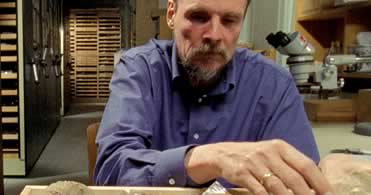You sometimes hear that blind people have disadvantages. Don't say it to Geerat Vermeij. He got into graduate school at Yale after proving to the faculty he could identify shells through their shape and feel - using samples at random from their collection.
Vermeij, now 60, contracted a rare childhood form of glaucoma and has been blind since age 3. He discovered his love of shells attending school in New Jersey at age 9, where his family had moved because they liked that state's policies on educating the blind more than their native Holland.

"I thought of them as beautiful works of art," he said.
Now Vermeij is best known for his work highlighting the impact of competition among species in evolution. Where many paleobiologists are thinking in terms of environments today, like the impact of global warming, Vermeij focuses on the evolutionary 'arms race' and how the escalation of attacking and defensive equipment evident in fossils propelled their development - and what competition means to the rest of us.
Dr. David Jablonski, a leading paleontologist at the University of Chicago, was quoted in a New York Times article:
Gary is a brilliant guy, an idea man, a synthesizer. It's very easy to think about how a predatory snail will catch a clam and kill it. But how does that play out over millions of years of ecological time? Gary is the guy who has really dug into that. His observations have swept the field and will still be cited 100 years from now. We should all be so lucky.
Vermeij has simple advice for science students who want to follow in his footsteps: "Love your subject, be prepared to work hard, don’t be discouraged by the occasional failure, be willing to take risks, get as much basic science and mathematics as you can take and perhaps above all display a reasoned self-confidence without carrying a chip on your shoulder."
Vermeij is an Academy Fellow and a professor of paleoecology at the University of California at Davis. He has published nearly a hundred scientific papers and four books, including Evolution And Escalation. He has been awarded MacArthur and Guggenheim fellowships, is a fellow of the American Association for the Advancement of Science, and has served as editor of leading journals such as Evolution and Paleobiology.




Comments